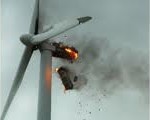 The tax credit for wind energy is back on the agenda, and Iowa’s own Chuck Grassley and Terry Branstad are taking leadership roles in fighting for the extension, going so far as to appear together at a press conference about it.
The tax credit for wind energy is back on the agenda, and Iowa’s own Chuck Grassley and Terry Branstad are taking leadership roles in fighting for the extension, going so far as to appear together at a press conference about it.
Wind energy is my favorite target at the moment, because it combines socialist economics, corruption, aesthetic vandalism, junk science, and cynical political machinations – all melting together into a hideous soup of wasted money and ruined skylines.
Tough Love
After the last election, targeting two of Iowa’s best known Republicans for criticism is perhaps a risky business, but for those who think I – with my dislike of leftists – shouldn’t be doing it, I offer the following historical analogy:
In the days of the Roman legions, the centurions were legendary for their swift discipline. One centurion developed a habit of breaking his staff over the backs of soldiers who had acted disobediently. “Give me another,†he would say to his aide when it happened, and it happened so often that “give me another“ became his nickname . In this way, withering cruelty became not a malicious attempt to destroy, but deep concern for long-term wellbeing.
Well, give me another.
Political Venture Capital
Wind energy is an odious political scam. First of all, the industry cannot survive without government subsidy, namely, the tax credits. The wind industry makes profits not from the power grid, but from their tax returns.
It is also ridiculously expensive and underproductive. When Alliant Energy built the Whispering Willows wind farm in Franklin County, they petitioned utilities regulators for a rate hike to help cover the cost. The market had reached a price for electricity, generated by coal, but at that price the wind farm was not economically viable – it wouldn’t produce enough electricity to cover its cost.
They built it anyway. Even though the money in the wind industry is earned on the tax return and not the power grid, they didn’t want to eat an operating loss, so rates have to increase. Consumers in central Iowa found themselves paying more money for the electricity they used – still mostly generated from coal – to pay for a wind farm erected so the utility could earn a tax credit.
The utility sells the power and claims the credits; the landowners earn fees for having these modern art sculptures on their land; the turbines produce just enough electricity to power a massive, metaphorical conveyor belt carrying money from the pockets of poor customers to the rich and the politically-connected… Because that is progress these days.
Grassley stated at the recent news conference that “We have a 20 year investment in this… it would be terrible to throw a way a 20 year investment if it will mature in a short time.â€
We have been waiting for the wind energy industry to mature since the days when pioneer farmers could order a windmill from the Sears and Roebuck catalog. Most of them were dismantled after rural America was electrified. Now, the fantasy is that the same technology that was felled by electricity will be the future of electricity.
Central Dreaming
Nothing becomes outdated faster than a fantasy about the future. This is never more true than when the fantasy has its birth in the minds of politicians; a future brought to you by the same people who bring you inflation, wars, and prisons.
The general public is also rapidly becoming too poor to cover higher utility bills, but wind energy fits into the political rhetoric of our time and so they charge forward. Wind energy doesn’t make power cheaper, reduce our trade deficit, strengthen the dollar, or generate tax revenue – but it can get you elected.  It employs only a handful of people, especially when compared to the coal industry – which politicians have threatened to kill. The turbines themselves are insanely ugly, and provide a far too convenient backdrop for political photo opportunities.
I understand that this is politics. I also object to the fact that this is politics. The experience of subsidized public housing should have been enough to dispel the urge to make fantasy into reality, but it wasn’t. We will all pay the price. Literally.
